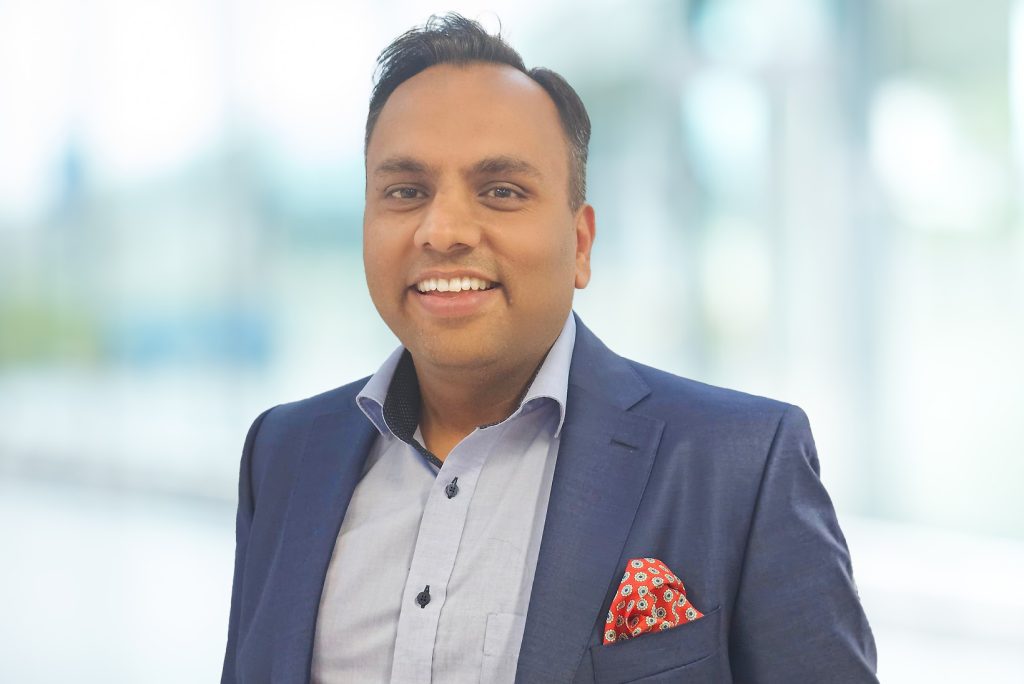August 27, 2023
As the national tree of India, the respected Banyan symbolises growth, strength and longevity – a dependable permanence rooted within the chaos of daily life.
Mentioned in many ancient texts and scriptures, the unusual and evergreen structure grows aerial roots from branches down into the ground, allowing new trunks to emerge and spread laterally for long distances.
Capable of surviving adverse conditions such as droughts, floods and storms, a Banyan lives for centuries and represents self-awareness through the quieting of one’s mind.
Naturally, many meanings can be translated into business lessons but for Sachin Verma – an entrepreneur embarking on the next phase of growth – one notable sentiment holds true.
“There’s a saying in Indian culture that nothing grows under the Banyan Tree,” said Verma, speaking as Managing Director of Oreta.
“This is the most shadiest of the trees but nothing grows because there’s no sunlight. You could be the best leader in the world but if you don’t allow any sunlight, then nothing would grow underneath you.”

Citing Multipliers: How the Best Leaders Make Everyone Smarter – a New York Times Best Seller – Verma outlined the art and science of entrepreneurship.
According to author, Liz Wiseman, two dramatically different types of leaders exist:
“Always look for multipliers,” Verma explained. “When you hire good talent, the DNA of that good talent is multiplying as they enable people further. Always invest in top talent and build leadership teams – you have to let them shine and contribute.”
Through combining Banyan wisdom with the multiplier effect, Verma is elevating Melbourne-based Oreta – a leading managed service provider (MSP) with expertise in cloud, networking, security and workplace offerings – to new heights on four strategic fronts.
While realising talent ambitions in Chandigarh and scale objectives in Sydney, the business has built a cyber security practice from scratch and developed unique intellectual property (IP) as a software development house.
“We’ve made all our big moves on the chess board, now it’s about the orbit of growth,” Verma said. “As the orbit gets bigger, we’ll spin with the cycles.”
Accessing new talent pool in India
After bunkering down during COVID-19, Oreta – established in 2015 by Verma and Rajitha Rajasingham – encountered an inflated labour market in which accessing talent at competitive salary rates proved borderline impossible.
Hiring in Australia was – and still is in many cases – dictated by exorbitant remuneration packages for average expertise, hindered further by a shortage in supply.
“It was a double whammy,” Verma recalled. “How much can you pass onto your customers? How much can you absorb and dilute your profitability? How can you find the right amount of people to scale?”
This was a business growing at 30% year-on-year with people as the primary stock to sell, a conundrum which opened the door to upsizing capabilities in India.
Once the COVID-19 clouds were lifted in March 2022, Verma visited his hometown of Chandigarh and started the process of scaling operations.
As the capital of the northern Indian states of Punjab and Haryana, Chandigarh as a destination bucked the trend in terms of building muscle offshore. Most companies land south but Verma firmly planted the Oreta flag north.
“Engineers and architects had been working from home for two years but would soon have to go back to the big cities and technology hubs such as Bangalore,” he explained. “We offered an alternative which avoided the competitive talent pools.”
After on-boarding the first employee in April 2022, Oreta now sits at close to 50 employees offshore focused primarily on back-office operations such as finance, plus service desk support across network, cloud, security and workplace practices.
“Always look for multipliers. When you hire good talent, the DNA of that good talent is multiplying as they enable people further. Invest in top talent and build leadership teams”
Verma had a simple motivation; to scale talent. India has since almost doubled the company’s total headcount to approximately 110 employees.
“We now have talent pools in Melbourne, Sydney and Chandigarh,” Verma said. “Yes, there’s a narrative that India means cheaper but that’s not the case. We’re not shying away from paying top dollar – we’re gunning for talent and we need to pay a premium for that.”
For those yet to be persuaded on the topic of quality, Verma recommended researching the number of unicorns originating out of India compared to Australia. Spoiler alert, India has already surpassed 100 and is ranked third globally, behind only the US and China.
“Customers care about quality and as long as we can demonstrate our regimented processes and the capabilities we can offer, we see strong uptake,” Verma added.
“But we want to be fair and pass on those benefits to customers as well. We have an onshore-only rate card for government customers plus blended rate cards. Customers understand both models.”
The multiplier effect is also in action through the company’s high potential strategy which develops top talent across all locations. For those in Chandigarh, that means a pathway to Australia through training programs and skilled work permits.
“We have three employees now in Australia from India,” Verma said. “They are working with our customers and contributing to our scaling machine. Because of this, we’re no longer shy of bidding for large work.”
Building a cyber security practice
With the talent engine in India now humming, Oreta turned attention to security and started the process of building a dedicated in-house cyber practice from the ground-up.
Leveraging the experience of Kevin Bloch – Founder and CEO of Bloch Advisory and formerly CTO of Cisco – Verma and his leadership team kicked plans into action during mid-2022 through an accelerated recruitment drive and technology acquisition strategy.
“We went full throttle,” he said.
Hiring focused on governance, risk and compliance (GRC) managers to set up a GRC practice, in addition to recruiting cyber talent to build a security operations centre (SOC), plus engineers and 24/7 support from India. Faizal Janif was also recruited in early 2023 as Head of Security to oversee all hires and operations.
Vendor assessments were equally in-depth and extensive, involving Oreta engaging with all aspects of the market to help curate a credible service offering.
“There was five vulnerability assessment tools in the market, so which one do you choose?” Verma asked. “We spent 6-7 months in the trenches literally building our practice and gradually releasing our catalogue of services, the last of which comes out in September.”
As the most planned company investment since launching, the aim was to “not put the cart before the horse” and instead build with precision and patience.
“This wasn’t a case of working on a live aeroplane,” Verma qualified. “We absolutely grounded the plane, carried out the work and then let it fly. You can’t muck around with security.”

Once finalised, Oreta hardened all existing IT services and customer environments – without prompt or payment – and started to educate users on the new capabilities.
“This wasn’t in our scope and we didn’t charge,” Verma said. “We’re in some serious negotiations now which validated our approach.
“Unless you have senior people, tools and relationships supported by case studies you can’t be calling yourself a strategy security partner. This completed the wheel of cloud, network and security. You can sell all three independently and become an MSSP but the true value for customers is when combined.”
Building IP, scaling through software
In the relentless pursuit of scaling through people as a services-led business, Verma also recognised the potential of expanding via IP by becoming a product company.
GlanceX was born.
“I never imagined that we’d be writing IP or software,” Verma acknowledged. “But when you’re in the market and you know you can solve a problem, then necessity becomes the mother of invention.”
After investing hundreds of thousands of dollars, Verma recalled the almost surreal feeling of watching six developers mindlessly coding away building the dream.
“You’re sitting on the sidelines questioning yourself and the first six months is all nervousness,” he shared. “Building IP is a leap of faith. It’s like falling off the cliff and not knowing how deep the water is.”
GlanceX was the answer to the question dominating a leadership team brainstorming session; how can Oreta differentiate and demonstrate value?
“Businesses talk about multi-cloud but nobody mentions multi-network,” Verma noted.
Despite a surge of software monitoring tools providing a single view of Amazon Web Services (AWS), Microsoft Azure or Google Cloud Platform (GCP) environments, the same problem statement has yet to be tackled for SD-WAN.
“Networking is one of the largest investments a CIO makes but from a cost perspective, how much visibility do they actually get?” Verma questioned. “So we double clicked and built a tool capable of ingesting networking data into a data lake and creating something meaningful from an analytics perspective for our customers.”
Through providing “at-a-glance” visibility across multiple IT functions via a non-technical interface, the product translates data from sources such as multi-vendor technology management platforms.
“This wasn’t a case of working on a live aeroplane. We absolutely grounded the plane, carried out the work and then let it fly. You can’t muck around with security”
The tool is capable of overseeing network, mobility and security environments rather than companies running the risk of flying blind.
“Once you have visibility you can’t go back to being blind,” Verma said. “One of our customers recently changed telcos but wanted us to follow because they knew if they lost GlanceX, they would lose all visibility.”
Shaped by the feedback of strategic customers, more than 60 businesses are using the platform which now operates as a self-propelling machine. Feedback loops and new features are commonplace with the platform architected to build connectors and on-board new vendors into the data lake.
“The ultimate goal is to retire all our manual reports and have everything originate from GlanceX,” Verma outlined. “We want to be transparent and allow customers to look at network health, ticketing and spend all through their phone.”
Settling into Sydney life
Fresh from relocating the company’s Sydney office to Martin Place and having leadership team representation in the city, Oreta is also starting to achieve sustainable growth beyond home turf in Melbourne.
“It’s taken us roughly six years,” he highlighted.
In the early days, Andrew Jones – Head of Delivery at Oreta – would travel to Sydney every week from Melbourne and practically live out of a suitcase. Verma would support as the salesperson on the ground attempting to open up big accounts.
But it was tough because the sales motion is different – Melbourne is relationship based while Sydney is commercial focused.
“We found quicker sales cycles that were more transactional in Sydney,” Verma said. “Melbourne is a difficult place to acquire a customer but once you do, they can stay for life.”
Multipliers were key however with most MSPs struggling by failing to achieve minimum viable scale. While pinpointing that exact number is challenging, Verma considered it to be approximately 10 people with a solid office presence and roughly 6-7 large customers.
“That cracked the ceiling for us,” he added. “To get to that stage you have to keep going but a lot of people stop running that race because they become too tired. The fact that I’ve not visited Sydney for two months is a testament to the strong team we have in place there now.”
In looking back on almost a decade of existence, Verma said that while the business looks and feels differently the why hasn’t changed, nor has the motivation to get out of bed every morning.
“There is an element of thinking ‘wow, how did we even get here?’ but we’ve always been guided by strong strategic planning and valuable customer conversations,” he emphasised.
Inform your opinion with executive guidance, in-depth analysis and business commentary.